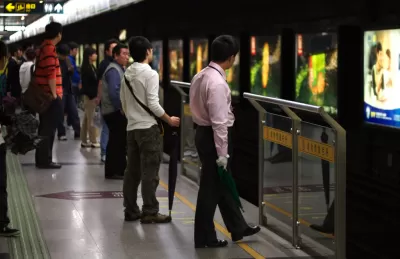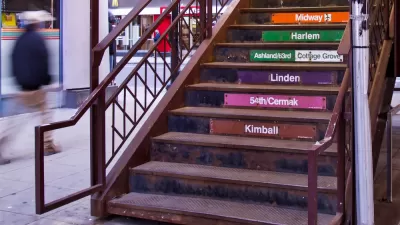The problem, Paul Rosenstiel writes, isn't a scarcity of capital. It's an unwillingness to make investing in infrastructure a lucrative choice for private capital.

It's becoming a recurring theme to remark on what China can do that we can't. According to Paul Rosenstiel, former deputy state treasurer for California, we've become used to a diminished version of what's possible. "During the nearly identical years that the Shanghai Metro went from nothing to the largest subway system in the world, California struggled just to replace a few miles of the San Francisco-Oakland Bay Bridge damaged by the 1989 Loma Prieta earthquake."
Gloomy as that sounds, Rosenstiel says the money's there waiting to be invested. "We don't need capital. What we need is a revenue source to provide a return on that capital. But for a quarter-century, we haven't been able to find the political courage to leverage that capital by taking such an obvious step as raising the federal gasoline tax."
True momentum on infrastructure would mean a move away from "bromides" like public-private partnerships or infrastructure banks. If private investors could be certain of a return, either via higher taxes or user fees, they'd be happy to kick in the billions necessary. What we need is more decisiveness about what to build in the first place.
FULL STORY: China Can Build Infrastructure. Why Can’t We?

Alabama: Trump Terminates Settlements for Black Communities Harmed By Raw Sewage
Trump deemed the landmark civil rights agreement “illegal DEI and environmental justice policy.”

Planetizen Federal Action Tracker
A weekly monitor of how Trump’s orders and actions are impacting planners and planning in America.

The 120 Year Old Tiny Home Villages That Sheltered San Francisco’s Earthquake Refugees
More than a century ago, San Francisco mobilized to house thousands of residents displaced by the 1906 earthquake. Could their strategy offer a model for the present?

LA’s Tree Emergency Goes Beyond Vandalism
After a vandal destroyed dozens of downtown LA trees, Mayor Karen Bass vowed to replace them. Days later, she slashed the city’s tree budget.

Sacramento Leads Nation With Bus-Mounted Bike Lane Enforcement Cameras
The city is the first to use its bus-mounted traffic enforcement system to cite drivers who park or drive in bike lanes.

Seattle Voters Approve Social Housing Referendum
Voters approved a corporate tax to fund the city’s housing authority despite an opposition campaign funded by Amazon and Microsoft.
Urban Design for Planners 1: Software Tools
This six-course series explores essential urban design concepts using open source software and equips planners with the tools they need to participate fully in the urban design process.
Planning for Universal Design
Learn the tools for implementing Universal Design in planning regulations.
Ada County Highway District
Clanton & Associates, Inc.
Jessamine County Fiscal Court
Institute for Housing and Urban Development Studies (IHS)
City of Grandview
Harvard GSD Executive Education
Toledo-Lucas County Plan Commissions
Salt Lake City
NYU Wagner Graduate School of Public Service



























